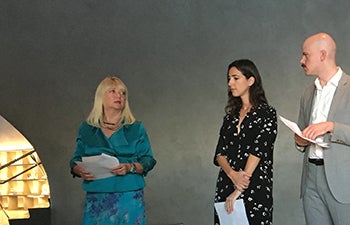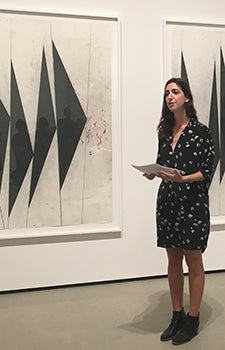
A tour of the imagination: Art inspires graduate poetry at The Broad
It was after hours at the museum and the abstracted black butterfly wings of Mark Grotjahn’s 2007 series Untitled (Dancing Black Butterflies) appeared to flutter across the white walls of The Broad, surrounding poet and doctoral student Callie Siskel as she read aloud her poem “Vanishing Points.”
Inspired by Los Angeles artist Grotjahn’s series of nine angular black and white drawings addressing perspective, Siskel’s poem captivated more than 60 invited guests who listened attentively before breaking into loud applause. The group then moved through the unusually quiet museum toward a 2010 painting by New York-based artist Rudolf Stingel. There they heard poet Liz “LA” Johnson — like Siskel a USC Dornsife doctoral student in creative writing and literature — read her poem on memory, Portal, inspired by Stingel’s untitled landscape.
Siskel and Johnson were among five doctoral students — four in creative writing and literature and one in art history — participating in the April 19 student poetry reading at The Broad organized by former California poet laureate and Professor of English Carol Muske-Dukes as the culmination of her graduate poetry course “A Tour of the Imagination.” Students selected art works currently exhibited at the museum and wrote poems inspired by their choices over the course of a semester. In addition to Grotjahn and Stingel, students chose works by Kara Walker, Robert Rauschenberg and Yayoi Kusama.

Carol Muske-Dukes, professor of English and former California poet laureate (left), and doctoral students Callie Siskel and Grant Johnson participate in a group reading for six voices of a poem written in response to The Visitors, a video installation by Ragnar Kjartansson.
“The poems that emerged from imaginations of students in this ekphrastic course and were showcased at the ‘Night at the Museum’ after-hours reading elicited intense enthusiasm,” Muske-Dukes said. The audience remained spellbound as the poets came together for the final reading — an ensemble piece for six voices inspired by The Visitors, a video installation by Ragnar Kjartansson. These poems will be published in chapbook form by Lulu Press this summer.
The idea of the course came up a few years ago during an event hosted by The Broad, Muske-Dukes said.
“During dinner, I talked to Ed Patuto, director of audience engagement at the museum, about the current running between poetry and art: how the visual and the literary flow together in imagination. Like most poets, I’m inspired by images and how images become words. That sense of inspiration formed the basis for the course.”
Inspiring a new willingness to experiment
Siskel, a Chicago-native whose poems have been published in such prestigious journals as The Yale Review, Poetry Northwest, 32 Poems, Passages North and The Hopkins Review, said she was drawn to the course by the opportunity to work again with Muske-Dukes, with whom she had already taken a Fall semester class on the intersection of film and poetry.
“Also, what drew me to the class was the exceptional opportunity to be in The Broad, not as a visitor but as a poet,” she said.

Callie Siskel reading her poem “Vanishing Points” inspired by California artist Mark Grotjahn’s work Untitled (Dancing Black Butterflies).
After visiting the museum, Siskel immediately knew she wanted to write about Grotjahn’s Untitled (Dancing Black Butterflies) because “it just kept beckoning me.
“Grotjahn’s drawings evoked in me the sense of obsessive longing and loss, themes that I — and many poets — write about. The artist’s intellectual project on perspective only bolstered my interest — this idea of a vanishing point, which is also such a gorgeous phrase. ”
Siskel returned to the museum several times to spend time with the dancing black butterflies, finding that Grotjahn’s work inspired in her a willingness to experiment.
“The nature of the art work as a series that is pursuing different angles made me break out of my comfort zone,” she said. “Instead of writing a more continuous narrative, I worked against that and disrupted my natural process, experimenting with disjunctive sections that could approach and re-approach the subject from different angles.”
Siskel also welcomed the rare opportunity to write in anticipation of a reading.
“Normally, poets hope that they’ll be lucky enough to read their work,” she said. “But this made me think very carefully about the oral tradition of poetry and what would sound good, clear and traceable to an audience. That was an important exercise.”
Nostalgia and memory
Johnson, a Provost’s Fellow whose poems have appeared in The Southern Review, Antioch Review, Indiana Review and other journals under her professional name, LA Johnson, said she, too, jumped at the chance to write a poem in response to a work of art.
“One of my favorite pastimes is going to museums, and I do get a lot of inspiration from art in my own work,” she said. She was drawn to Stingel’s piece portraying a landscape from the artist’s childhood because it reminded her of her own poems about memory. “As I thought more about the piece and spent more time with it, I felt a real sense of nostalgia,” she said.
The poem she wrote in response to the painting explores how others shape our memories and how they can bring back forgotten landscapes.
“The piece invoked in me many different ideas about memory. It made me explore what it means to have a memory from childhood made into a work of art and have others see it, so that the artist’s experience becomes part of the viewer’s experience.”
Johnson was delighted with the opportunity to participate in the reading at The Broad. “This is probably the best reading I’ve ever done,” she said, “to the most — and the most interested — people.”
Both students expressed appreciation of Muske-Dukes’ teaching and mentorship.
“Professor Muske-Dukes gives the best feedback,” Johnson said. “She has great insight for the heart of the poem and ensuring it has enough space to breathe. She makes all my poems better.”